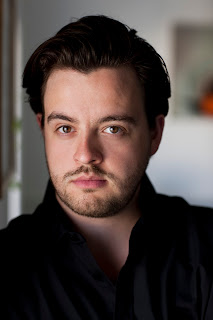 |
| Ben Johnson, credit Chris Gloag |
The Trafalgar Sinfonia is a string ensemble of some 12 young professional players. It was formed in 1992 by Ivor Setterfield and they are in their 14th season of concerts at St Martin in the Fields. Whilst many of the concerts there seem to be of the Vivaldi by Candlelight genre, in fact if you look at the repertoire they play there are some interesting nuggets to be had. On 22 August for instance, you can hear concertos from Vivaldi's L'Estro Harmonico and La Stravaganza.
They opened with a crisp and lively performance of the sinfonia from act three of Handel's Solomon (The Arrival of the Queen of Sheba) in a version which replaced Handel's oboes with solo violins. This was a firmly modern performance with bows definitely on string, but the players made a rich sound with a nice bounce to it. There were similar virtues in Purcell's Chacony in G minor (Z730) which Setterfield made quite dramatic at times.
The ensemble was joined by Ben Johnson and James Topp, principal horn with the English Symphony Orchestra, for a performance of Britten's Serenade for tenor, horn and strings. The acoustic at St. Martin in the Fields is quite resonant, which has both advantages and disadvantages in a work like this but all concerned seemed to be attentive to balance and other issues. The solo horn Prologue was immensely resonant and impressive, though it has to be admitted that it did take Topp a little time to get his lip securely into gear.
In the Pastoral the strings were quiet, but with an admirably present feeling which supported Johnson's lovely firm tone. Singing with a full toned lyric voice, Johnson displayed an admirably supported sense of line combined with a very fine feeling for the words. The way he shaded his voice at the top in the opening of the first two verses was lovely.
In Nocturne whilst Johnson preserved the virtues of the Pastoral, his performance became more exciting and positively thrilling. His control was admirable and you felt that he never lost sight of the text and the musical line even in the most taxing moment.
Elegy had a finely dramatic introduction and postlude from Topp and the ensemble, whilst Johnson was beautifully pointed with Blake's words. A fine performance was completed with some lovely hand-stopping at the end from Topp.
Starting unaccompanied, Johnson's voice threaded its way through the Dirge drawing us along and always giving the maximum weight to the words. The unaccompanied opening was magical and as the movement developed the sheer power threatened to overwhelm in the lively acoustic. There were times when I felt that Johnson's voice was rather more present than some in this work but the effect was very fine.
Hymn was fleetly crisp, with Johnson admirably getting the words over, complemented by some fabulous horn playing from Topp. Then Sonnet opened with Johnson almost caressing the melodic line, again developing to quite a full voice. Topp's Epilogue was admirably evocative.
I am quite sure that Johnson will develop his interpretation of this work but they way he combined a sense of line and words with full tone is already admirably evocative.
After the interval the ensemble opened with the ninth of Handel's Concerto Grosso Op 6. The dramatic Largo led into a crisp and rather perky Allegro with some nice textures combining soli with tutti. The Larghetto was almost a gentle siciliano leading to a dancing Allegro. Finally an elegant Minuet, though not without drama, and a crisp brisk Gigue.
This was followed by Elgar's Serenade for Strings, in a finely crafted performance which brought a lovely ebb and flow to the work.
We were then treated to three Handel arias. First of all Johnson sang Where e'er you walk from Handel's Semele, in which he combined a lovely firm tone with a fine feeling for the words. The da capo was nicely and discreetly ornamented. Johnson's full but sympathetic tone rather reminded me of Robert Tear in this repertoire.
Next came Ombra mai fu from Handel's Serse in which conductor Ivor Setterfield demonstrated a creditable high counter-tenor voice with a nice sense of line.
Finally Johnson sang Waft her, Angels from Handel's Jephtha. This was simply magical, as Johnson's feeling for line combined with his powerful sense of the text to create a strongly evocative performance. This was the only piece that Johnson sang from music but I do hope that we might hear him in the complete role sometime.
Johnson brought a magical simplicity and directness to Britten's O Waly Waly, making the whole seem expressively effortless, drawing us into the narrative and illuminating it with beauty of tone.
Finally the orchestra played Astor Piazolla's Oblivion a rather enchanting piece based on a habanera rhythm; slow and moody with a lovely violin solo.
As a programme the evening did not quite hand together, but individual items impressed and I was pleased to be able to hear Ben Johnson in the Britten with such sympathetic companions.
Elsewhere on this blog:
- Tete a Tete: the Opera Festival - a second helping
- Billy Budd at Glyndebourne
- Tete a Tete: the Opera Festival - 7 August
- Viktor Bijelovic - Empassioned - CD review
- John Eliot Gardiner conducts Bach at the Proms
- Grimeborn - Magic Flute
- The Bear goes Walkabout
- Stile Antico - Phoenix Rising - CD review
- Dinner opera at the diner - Roma and La Plus Forte
- Dai Fujikura - Flare - CD review
- Edward Cowie - Gesangbuch - CD review
- Home




.webp)

.jpg)




No comments:
Post a Comment